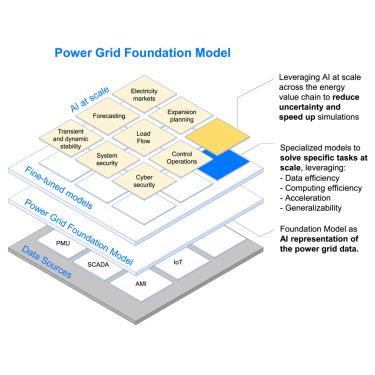Foundation models for the electric power grid
IF 38.6
1区 材料科学
Q1 CHEMISTRY, PHYSICAL
引用次数: 0
Abstract
Foundation models (FMs) currently dominate news headlines. They employ advanced deep learning architectures to extract structural information autonomously from vast datasets through self-supervision. The resulting rich representations of complex systems and dynamics can be applied to many downstream applications. Therefore, advances in FMs can find uses in electric power grids, challenged by the energy transition and climate change. This paper calls for the development of FMs for electric grids. We highlight their strengths and weaknesses amidst the challenges of a changing grid. It is argued that FMs learning from diverse grid data and topologies, which we call grid foundation models (GridFMs), could unlock transformative capabilities, pioneering a new approach to leveraging AI to redefine how we manage complexity and uncertainty in the electric grid. Finally, we discuss a practical implementation pathway and road map of a GridFM-v0, a first GridFM for power flow applications based on graph neural networks, and explore how various downstream use cases will benefit from this model and future GridFMs.


电网基础模型
基础模型(FMs)目前占据了新闻头条。他们采用先进的深度学习架构,通过自我监督从庞大的数据集中自主提取结构信息。由此产生的复杂系统和动态的丰富表示可以应用于许多下游应用程序。因此,FMs的进步可以在电网中找到应用,以应对能源转型和气候变化的挑战。本文呼吁发展面向电网的FMs。在不断变化的电网挑战中,我们强调了它们的优势和劣势。有人认为,从各种网格数据和拓扑中学习的网格基础模型(gridfm)可以释放变革性能力,开创一种利用人工智能重新定义我们如何管理电网的复杂性和不确定性的新方法。最后,我们讨论了GridFM-v0的实际实现路径和路线图,这是基于图神经网络的潮流应用的第一个GridFM,并探讨了各种下游用例将如何从该模型和未来的GridFM中受益。
本文章由计算机程序翻译,如有差异,请以英文原文为准。
求助全文
约1分钟内获得全文
求助全文
来源期刊

Joule
Energy-General Energy
CiteScore
53.10
自引率
2.00%
发文量
198
期刊介绍:
Joule is a sister journal to Cell that focuses on research, analysis, and ideas related to sustainable energy. It aims to address the global challenge of the need for more sustainable energy solutions. Joule is a forward-looking journal that bridges disciplines and scales of energy research. It connects researchers and analysts working on scientific, technical, economic, policy, and social challenges related to sustainable energy. The journal covers a wide range of energy research, from fundamental laboratory studies on energy conversion and storage to global-level analysis. Joule aims to highlight and amplify the implications, challenges, and opportunities of novel energy research for different groups in the field.
 求助内容:
求助内容: 应助结果提醒方式:
应助结果提醒方式:


